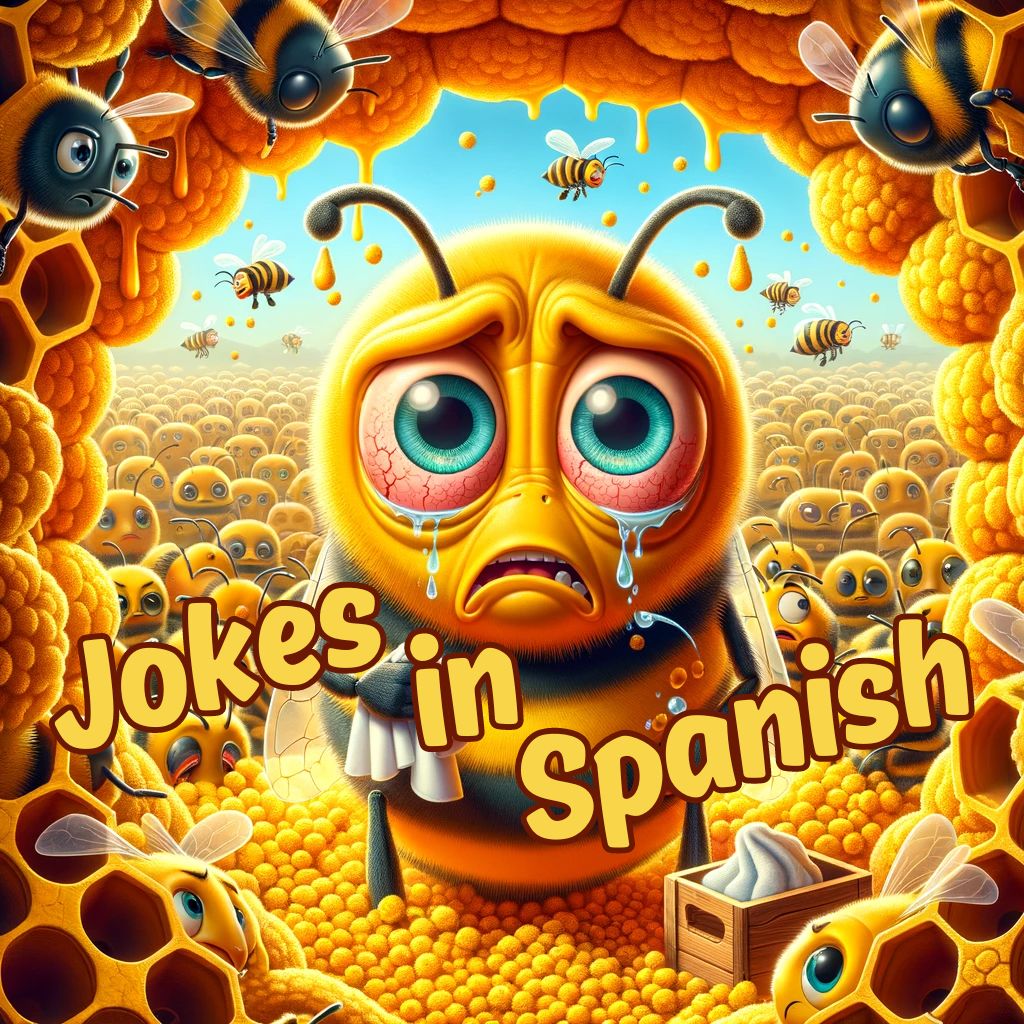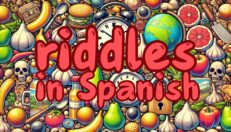Funny Spanish Jokes: 16 scenarios to make you jajaja!

Get our free email course, Shortcut to Conversational.
Have conversations faster, understand people when they speak fast, and other tested tips to learn faster.
More infoLearning a new language can sometimes be challenging, but injecting a bit of humor into the process can make it both enjoyable and memorable. Besides, being able to share a few Spanish jokes can take your language skills to another level, turning you into a conversational maestro and adept icebreaker.
With this in mind, we bring you our top 16 funny Spanish jokes to make you laugh out loud in Spanish! We provide explanations for each one, so you’ll know exactly what you’re talking about with each joke.
Jokes in Spanish come in many forms, including puns, comparisons, and riddles. That being said, there are a number of Spanish joke patterns that are very popular across the Hispanic world such as wordplays, Jaimito jokes, and colmos. We’ll break down our Spanish jokes into these three broad categories.
Let the show begin!
Jaimito or Pepito jokes
Jaimito is a character commonly used in Spanish humor. The same character is known as Pepito in some countries like Mexico and Cuba, so Pepito is quite common in many Mexican jokes in Spanish.
Jaimito is often portrayed as a mischievous schoolboy who comes up with witty and sometimes cheeky responses to his teachers and classmates. In English-speaking cultures, an equivalent mischievous character could be called Little Johnny.
La tarea – Homework
- Jaimito: Profesora, ¿usted regañaría a un niño que no ha hecho nada?
- Profesora: Claro que no, Jaimito.
- Jaimito: ¡Qué bueno! Porque no hice la tarea.
- Jaimito: Teacher, would you scold a kid who hasn’t done anything?
- Teacher: Of course not, Jaimito.
- Jaimito: Good! Because I didn’t do my homework.
Clever Jaimito always has a cheeky comeback for his teachers!
Los elefantes – The elephants
- Profesora: Jaimito, dime cinco animales de origen africano.
- Jaimito: Cinco elefantes, profesora.
- Profesora: Jaimito, name five animals of African origin.
- Jaimito: Five elephants, teacher.
Sneaky Jaimito always gets away with it!
Los ahorros – Savings
- Pepito: Jaimito, ¿cuánto dinero tienes ahorrado?
- Jaimito: Ceromil cerocientos cero cero.
- Pepito: How much money have you saved?
- Jaimito: Zero thousand zero hundred zero zero.
The joke is that Jaimito is saying he has zero money saved up, but he playfully expresses it using a combination of words to sound like a big number.
Dos por uno – Two for one
- Profesora: Jaimito, ¿cuánto es 2 x 2?
- Jaimito: Un empate.
- Profesora: ¿Y 2 x 1?
- Jaimito: ¡Una oferta!
- Teacher: How much is 2 x 2?
- Jaimito: It’s a tie.
- Teacher: And 2 x 1?
- Jaimito: That’s a deal!
This joke in Spanish doesn’t translate well into English, because of how you state multiplication. Whereas you say two times one when talking about math, the Spanish equivalent, dos por uno, can also be translated into English as two for one.
This wordplay leads to Jaimito’s cheeky response, treating the question from his teacher as a transactional question rather than a multiplication problem. Two for one is a deal!
Colmos
In Spanish, a colmo is a situation that reaches an unsurpassable level. In everyday speech, it serves as a means of exaggeration. A colmo signifies an inadmissible absurdity that leads to dissatisfaction or displeasure in the speaker, like a sort of last straw.
In Spanish jokes, colmos are used to make fun of an absurd situation.
La abeja alérgica – The allergic bee
- ¿Cuál es el colmo de una abeja?
- ¡Ser alérgica al polen!
- What’s the last straw for a bee?
- To be allergic to pollen!
El payaso – The clown
- ¿Cuál es el colmo de un payaso?
- Que todos se lo tomen en serio.
- What is the last straw for a clown?
- To be taken seriously by everyone.
Another colmo. We wouldn’t expect a clown to be taken seriously.
El pastor y las ovejas – The shepherd and the sheep
- ¿Cuál es el colmo de un pastor?
- Quedarse dormido contando ovejas.
- What is the last straw for a shepherd?
- Falling asleep while counting sheep.
This one is pretty straightforward, but it’s still a funny joke in Spanish. It plays on the concept of counting sheep as a common method to help oneself fall asleep, mixed with the occupation of a shepherd who tends to sheep.
Wordplay
Many jokes in Spanish take advantage of the fact that a lot of Spanish words have multiple meanings or similar pronunciations. Think of an English speaker pointing to a bale of hay and making the interjection hey!
These jokes don’t translate very well, so we’ll spend some time with each one to explain the Spanish wordplay.
La ballena – The whale
- ¿Sabes cuántos peces caben en una ballena?
- ¡Ninguno, porque va llena!
- How many fish fit in a whale?
- None, because she’s full!
This is a very popular wordplay! The word ballena, meaning whale, is pronounced the same as va llena, which means gets full.
Spanish actually has many such homonyms, which are different words with the same pronunciation.
El pato – The duck
- ¿Qué pasa si tiras un pato al agua?
- ¡Nada!
- What happens if you throw a duck in the water?
- Nothing! / It swims!
This joke in Spanish plays on the double meaning of the word nada. You probably know that nada in Spanish translates directly as nothing. It’s also the third-person singular conjugation of the verb nadar, which means to swim, so the other meaning of nada is it swims.
This wordplay in Spanish uses a particular subset of homonyms that comprise conjugated verbs pronounced like other words.
So what happens if you throw a duck in the water? ¡Nada!
La impresión – The impression
- ¿Qué le dice una impresora a otra?
- ¿Esta hoja es tuya o es impresión mía?
- What does one printer say to another?
- Is this sheet yours or is it my printout? / Is this sheet yours, or is it just my impression?
This joke plays on a clever wordplay in Spanish, based on the double entendre of es impresión mía.
The Spanish word una impresión can refer to a printout, or it can have the same meaning as in English: an impression. Hence the wordplay when two printers are communicating, with the joke humorously suggesting that the first is asking the second, “Is this sheet yours, or is it just my impression?,” rather than referring literally to the physical sheet of paper.
El reloj – The watch
- Ana: ¡Me regalaron un reloj!
- Pedro: ¿Qué marca?
- Ana: ¡Pues la hora!
- Ana: I was gifted a watch!
- Pedro: What brand? / What does it show?
- Ana: The time!
This joke makes no sense in English, since the Spanish word marca has multiple meanings that are completely different. On the one hand, una marca is a brand of a product. On the other hand, marca is the third-person singular conjugation of the Spanish verb marcar. In addition to several other meanings, marca is the verb we use to ask what time a clock is showing.
The wordplay here is that it first seems that Pedro is asking about the brand of the watch, but Ana responds to the question of what her watch is showing. ¡La hora!
La persona saludable – The healthy person
- María: Soy una persona muy saludable.
- Diego: ¿Haces mucho deporte y comes sano?
- María: No. Es que la gente me saluda por la calle y yo les devuelvo el saludo.
- María: I’m a very healthy person. – I’m a very greetable person.
- Diego: Do you exercise a lot and eat healthily?
- María: No. It’s just that people greet me when I’m in the street and I greet them back.
This Spanish joke is another clever wordplay! Most adjectives ending with the suffix -able in Spanish indicate capacity or aptitude to receive the action of the verb. This happens in English as well by adding the same suffix to many verbs, for example with adjectives like likable or affordable.
María considers herself saludable because she takes the verb saludar, meaning to greet, and turns it into an adjective to mean that she is greetable: a nice person to greet and people love to do it. Diego’s interpretation of her statement, on the other hand, is rather based on the common meaning for saludable, which is actually healthy!
La nueva cocinera – The new cook
- Luis: La nueva cocinera es un sol.
- Diana: ¿Es muy amable?
- Luis: No, ¡lo quema todo!
- Luis: The new cook is a ray of sunshine.
- Diana: She’s very kind?
- Luis: No, she burns everything!
In Spanish, to call someone un sol, which literally means sun, implies that they are very kind and generous. However, in this case, Luis refers to the new cook as such for her capacity to burn the food!
El zorro inglés – The English fox
- Un zorro inglés se tropieza con un burro español.
- El zorro le dice “I’m sorry.”
- A lo que el burro contesta “I’m burry.”
- An English fox collides with a Spanish donkey.
- The fox tells him “I’m sorry.”
- So the donkey responds, “I’m burry.”
This one is a classic Spanish joke that acknowledges the fact that most Latin Americans know very little English, but might still at least recognize the basic expression I’m sorry. It helps when the two English responses in the joke are pronounced with a thick Spanish accent.
The scenario is a play on the Spanish words for fox and donkey: zorro and burro. Since the Spanish burro doesn’t speak English, he thought the English zorro was just introducing himself in English. He just tried to do the same!
El dogtor – The dogtor
- ¿Sabes cómo se dice “veterinario” en inglés?
- ¡Dogtor!
- Do you know how to say “veterinarian” in English?
- Dogtor!
Here’s another fun joke that plays on a couple of English words that even many Spanish-speaking kids will probably understand: dog and doctor. The made-up term dogtor creates a playful and humorous twist in the dialogue that’s way more approachable than veterinarian.
El purgatorio – Purrgatory
- ¿A dónde van los gatos cuando mueren?
- ¡Al purgatorio!
- Where do cats go when they die?
- To purrgatory!
The humor in this joke comes from the fact that the word purgatorio contains the word gato, which means cat in Spanish. You can use this joke in English if you emphasize the purr in purgatory instead, to emulate a cat’s purring.
Conclusion
What a fun ride! Today we took a look at 16 Spanish jokes, spanning several forms of humor in Spanish. We saw some of the most common Spanish joke structures along the way, including Jaimito or Pepito jokes, colmos, and wordplay. Several of them even incorporated some English words into their Spanish wordplay!
Perhaps these Spanish jokes didn’t make you cry with laughter, but we guarantee you that they make nice icebreakers. Plus, it’s a fun way to practice your conversation skills.
So next time you want to crack a smile, give some of these a try and share a couple of Spanish jokes with your friends!



